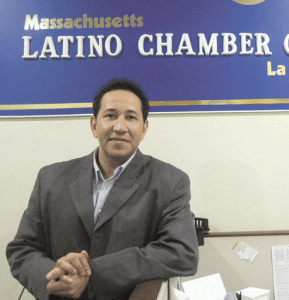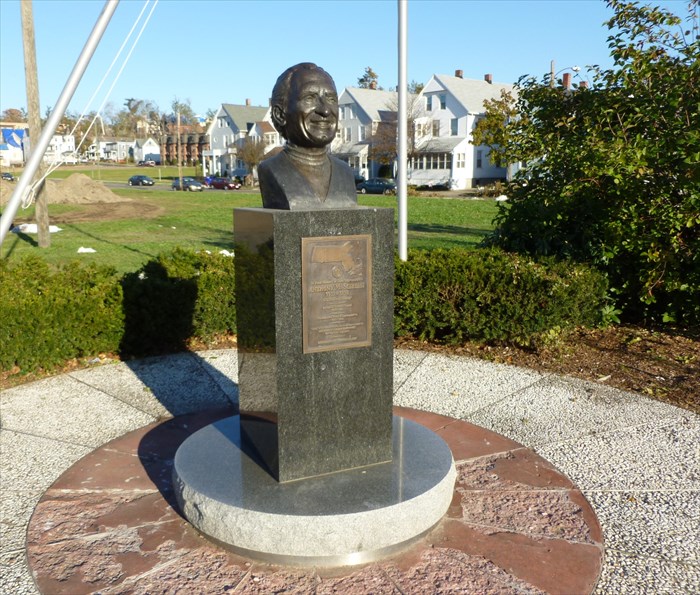Carlos Gonzalez’s Second Act in Political Life…

Carlos Gonzalez (via businesswest.com)
SPRINGFIELD—An open legislative seat in a predominantly minority area may come only once in a while. Very rarely does the same person have two opportunities within a relatively short period of time. However, with the woman who won it from him the first time now out of the electoral picture, Carlos Gonzalez has a second shot at the seat now identified as the city’s predominant Latino district.
Gonzalez, the head of the Massachusetts Latino Chamber of Commerce, faced off against Cheryl Coakley-Rivera in a caucus to replace Anthony Scibelli on the 1998 general election ballot. Scibelli had died suddenly after winning the primary prompting a rare activation of the law that orders a to fill the nomination. Coakley-Rivera won and Gonzalez backed her in the general.
“As soon as she won the caucus, we said we should support her,” Gonzalez.
Coakley-Rivera resigned in March to take a position with the Hampden County Clerk of Courts office. The seat vacated so late, not special election will fill the seat before the November election. Gonzalez joins Ward 3 City Councilor Melvin Edwards and labor and community activist Ivette Hernandez in the Democratic primary. No Republican or independent candidate has filed, thus the primary winner will almost certainly win the overwhelmingly Democratic seat in November.
The 10th Hampden district hugs the western edge of Springfield covering Ward 1 and parts of Wards 3 & 6, running from the North End, through downtown and the South End terminating in Forest Park, including the area around the park itself.
Gonzalez’s life turned from politics toward the Latino Chamber of Commerce about ten years ago. Even so, conventional wisdom for many years was that hard feelings nevertheless existed between Coakley-Rivera and Gonzalez. But Gonzalez disputes that, “We’ve grown and became friends.” Indeed, while the former rep let a number of potential candidates know about the opportunity her departure presented, only Gonzalez got her public backing.
“I ran into her by coincidence coming back from Boston,” Gonzalez said. “She really urged me to think about running.” He noted that his kids are a lot older now (his youngest is 17) and his family agreed to let him take the plunge back into politics.

Former Rep Cheryl Coakley-Rivera (via Facebook/official page)
He also rejected talk that Coakley-Rivera’s support was anything, but a sign of the respect between colleagues. The scuttlebutt in Springfield politics was that amidst the crisscrossing political alliances of the city, Coakely-Rivera got her job at the courthouse in exchange for endorsing Gonzalez. For his part, Gonazalez said that was ridiculous especially since rumors of Coakley-Rivera taking a job at the courthouse goes back years—and they do.
“As I have recognized her capacity to lead in the state house, she has recognized my capacity to lead in the community, in Springfield,” Gonzalez clarified.
One of eleven children, Gonzalez said his mother was raising her family on her own. She moved her kids up to Springfield from the Bronx after his brother was beaten up by gangs. The family lost their first apartment when the landlord found out they were Puerto Rican (a successful lawsuit would follow). They family lived in a Catholic-run shelter for a time before the Red Cross found them an apartment.
Gonzalez went to UMass-Amherst and later became a social worker. He said a strong focus of his during that time was to increase the number of Hispanic foster parents (and diversify the foster parent pool generally) an endeavor, he said bore fruit. Gonzalez had other activities, too, including helping to launch WSPR, a station with a varied history in Springfield, as a Spanish language radio station.

A memorial to Anthony Scibelli, a political mentor of Gonzalez’s, who died shortly after the 1998 primary. (via waymarking.com)
The turn to politics came via his godfather, who introduced Gonzalez to Michael Albano. Gonzalez said he was originally going to serve as an aide to Scibelli, and did briefly, but Albano recruited him to work as a mayoral aide instead. He stayed on Scibelli’s radar, however, and Gonzalez indicated that he was being groomed to succeed Scibelli.
Gonzalez said he was out of town when the long-serving rep died and by the time he returned Coakley-Rivera had locked up some critical support. His inability to succeed Scibelli as hoped may have been why some perceived hard feelings between the two rising figures in the Latino community. Gonzalez worked briefly for then-Rep Stephen Buoniconti before moving on to the chamber.
As the head of the Latino Chamber of Commerce, the birth of which was underway in the background of fate and politics, Gonzalez had his hand in helping innumerable “microbusiness” get off the ground. A microbusiness has less than $200,000 in revenue and 1-2 owners. Gonzales said the businesses the chamber nurtured included the solar and robotics. The programs the chamber ran included managerial training, literacy and the use of technology.
“We really focus on ‘there’s not hand-outs there are hand-ups,’” Gonzalez said.
Not surprisingly unemployment is high on Gonzalez agenda. Noting his chamber experience, he brought up microbusinesses again and the need for more investments like job-training and business startups.
“Seventy-two percent of the folks surveyed would rather start their own business rather than work for somebody else,” Gonzalez said.
Asked about the poverty that has stubbornly persisted in Latino communities, Gonzalez suggested that part of the problem is that it is easier to live off the system than to go to work. This, he said, was partly due to cuts in programs like daycare, which make it difficult for mothers to work. Gonzalez also called for more youth diversion programs that provide stipends and job training to address both poverty and crime to which young people often turn.
Gonzalez also said that at one time schools acted more like community centers and that modern school departments have gotten away from that. School should be better equipped to refer students to other needed services like mental health that is available elsewhere in the community.
But Gonzalez also touted his experience working with legislatures and government more broadly including Washington. “I have relationships with all of our state legislators to this day” from Springfield to Boston, he said. Gonzalez named dropped a number of DC denizens as well, providing a broader example of his capacity to work with a diverse pool of people.
“That, I think, is helpful when you dealing with legislators, you can’t only say what you want…you have to work collaboratively with folks who may think differently,” he explained.
With women’s reproductive rights big part of the past session, Gonzalez said he would advocate for women’s reproductive rights. While the legislature did pass a new buffer zone law, opponents are certain to challenge the new law as well.
On the buffer zone, he said, “It is a safety concern and that should supersede everything.”

Gonzalez said his focus was more on unifying Springfield, not the factions within the city’s Latino community in particular. (WMassP&I)
Gonzalez’s opportunity for a political career anew comes at a time when the Latino community is heavily fractured. Aside from his lingering political connections dating back to his time in government, Gonzalez may not fit cleanly into any of the community’s fractions, except, perhaps by extension Coakley-Rivera’s.
However, Gonzalez expressed little interest in unifying the city’s Latino fractions, preferring to look to the city as a whole. “It is not necessarily important to bring one community together, we have to bring one Springfield together,” he said noting that he had support that cut across the community’s factions, which anecdotally appears true. Gonzalez also touted his campaign’s outreach and identification of support among voters.
“I don’t have to agree with everybody just because they’re Latino and I won’t,” Gonzalez continued. “We have been working on building bridges with all communities in Springfield.”
In a similar vein, Gonzalez is hoping voters consider the election more broadly in light of his background. He cited the work he had done in government and in the private sector, but also the continuing ties he and his family have to several areas of the city. Together, he argues, they make him best able to represent the city’s interest on Beacon Hill.
“My commitment to public service can be measured by the work that I’ve done,” he said. Namely, he continued, “The roles and positions I’ve worked in professionally andnd the accomplishments that benefit all of Springfield, not one part of it.”

